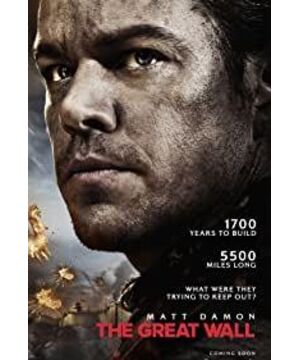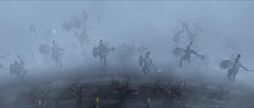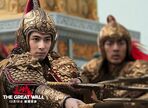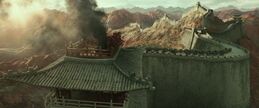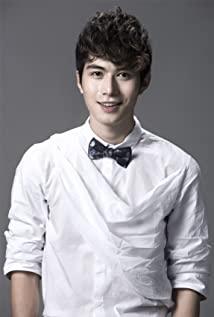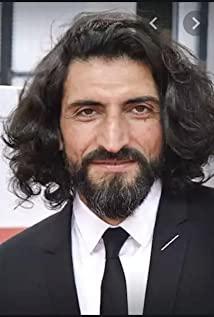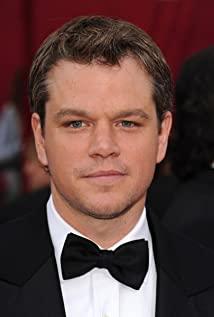"The Great Wall": The Art Show on the Edge of Yesterday
Text: Empty language is obvious
The "Great Wall" reviewed here is not a documentary of a certain history channel or geographic channel, but a parallel world costume fantasy action literary blockbuster released in the winter of Yilu Bingshen. The film is also said to be well choreographed and produced, and it stands to reason that audiences should rush to enjoy it, but it has attracted a lot of negative criticism. It may be because there are no superheroes in this film, which is disappointing.
Those negative criticisms are actually unfair, and it is easy to ignore the cultural and historical value of "The Great Wall". Originally, what the audience saw in the movie was often the superheroes of the Amilicon Federation who were busy saving mankind, and the main battlefield was often in the city of Amilicon. "The Great Wall" draws the audience's attention to the long-neglected battlefield of the Celestial Dynasty. The soldiers of the Celestial Dynasty once made unremitting efforts to protect human beings.
Some people criticized that the movie should not be called "The Great Wall", perhaps it should be called "I Fight Monsters in the Song Dynasty" or something like that is more appropriate. However, this criticism fails to realize that the name "Great Wall" is not so much about naming a storyline as it is about expressing cultural elements and carrying out cultural release. Yes, the Great Wall is one of the typical pronouns of celestial culture, standing there.
"The Great Wall" is a theatrical performance that releases Celestial culture within the mainstream European and American narrative framework. It is like the opening ceremony performance of the 2008 Beijing Olympic Games: the Olympic Games also belong to the European and American narrative framework, and Director Zhang Da has planned and displayed a lot of Chinese cultural elements in that opening ceremony. Celestial culture is much more than an opening performance can show. In "The Great Wall", this cultural release has been continued, and it has been done very well. In addition to the "Great Wall", the film also presents advanced technologies such as black powder, anesthetics, Kongming lanterns, hot air balloons, seismographs, and advanced concepts such as equality between men and women. Those listed are more obvious, and some are more subtle. For example, in the episode of the Bianliang melee, thousands of monsters gluttonously climbed up a brick and wood structure, and the building would not collapse, which shows how advanced the construction technology is. As a war movie, "The Great Wall" not only shows colorful armor, but also shows superb combat technology, or the art of war. At the end of the film, the advanced idea of "catch the thief first catch the king" is used to defeat the monster.
One thing is not clear, whether the combat method of the women's team in the film is to show the Western audience that extreme sports such as "bungee jumping" were actually invented by the people of the Celestial Dynasty. In fact, this bungee jumping attack is not as simple as it looks. After all, it is not very simple to make such an elastic rope; it also requires skills to manipulate the rope to prevent the female soldiers from hitting the wall. Although bungee jumping requires a high level of skill, the attack itself looks too fancy, even silly. Rather than saying that the women's team was attacking the monsters, they were using themselves as bait to feed the monsters. Monsters won't die after being stabbed so many times. You women soldiers bungee jump and stab the monsters to death. This is probably a plot twist. However, it would be too harsh to blame the film for these occasional plot flaws. As a film for cultural release, "The Great Wall" has allowed the world to see the advanced technologies of so many ancient celestial dynasties, and it has achieved its effect. To say that the logic of the plot is not clever, after all, the Chinese history only exported practical craftsmanship, not science and logic. Otherwise, there will be international friends who are amazed that the Chinese dynasty with so many advanced and practical technologies cannot produce modern science. It is really a pity.
It would be relatively narrow to attribute the flawed plot of "The Great Wall" to the fact that the Chinese dynasty has not been logical since ancient times. Because the plot of "The Great Wall" actually follows the narrative logic of Europe and the United States. It can be seen that the storyline of "The Great Wall" has too many similarities or similarities with the "Edge of Tomorrow" released in the past four years. They are all stories of people fighting alien monsters to protect themselves. The enemies are all alien monsters, and they are all organized into a super-organism by means of long-distance communication; the key to defeating the monsters is to kill the number one monster. The only difference is that the monsters in Edge of Tomorrow are more powerful, capable of manipulating time and space and predicting behavior, just like a living super quantum computer network, and correspondingly, defeating it also requires more complex skills; comparison of the monsters in "The Great Wall" Primitive, like a cold-blooded version of an ant colony, so the process to defeat it is also simpler. Moreover, the ideological changes of the male protagonists are also similar: they are all from escaping war to becoming a war hero, from insignificance to sublimation. There are other similarities in the plots of the two films, for example, they both say that war will train people, and both have scientists-like characters who analyze monsters, and so on. There are many similarities. "The Great Wall" only needs to change the background of the story and add some elements of Chinese culture, but it still uses four or five screenwriters to write the script, maybe, or these screenwriters have not heard of "Edge of Tomorrow", Or these screenwriters only spent their spare time working on this script.
Of course, there are many similarities in the story frame, and how the special effects and actors express the content of the story is another matter. In "The Great Wall", the performances of the gluttonous monsters are still quite into the drama, but the plot setting makes them look foreign, and they can't be too smart, otherwise the Song Dynasty will be destroyed, and mankind will be extinct. Taotie may also think that being smart or not in a movie is secondary, as long as the salary is high, it is very good.
View more about The Great Wall reviews


